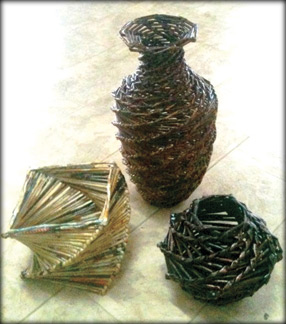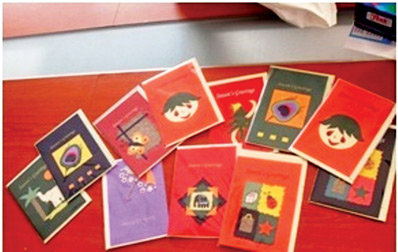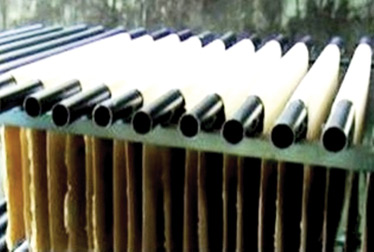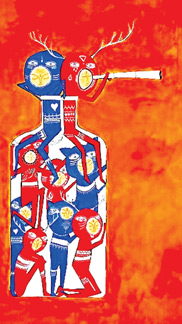|

Some of the novel handmade recycled items . |
Skills to empower battered women
By Carol Aloysius
While women worldwide and in Sri Lanka, were busy observing
International Women’s Day early this month, a celebration of a different
kind was taking place in the heart of Colombo.
It was a celebration of victory. A celebration by hundreds of bruised
and broken women whose lives, shattered by unending brutal violence
inflicted in their own homes, were announcing to society in general,
that they have finally been able to regain their confidence and self
esteem. They and were now prepared to bury their horrific past and move
on.
This they did by showcasing their inborn talents honed and encouraged
by a life skills program specially conducted on their behalf. The
program was aimed at giving them skills to earn an independent income,
so that they would never endure a future of pain and shame inflicted by
their husbands and partners,borne in silence within the four walls of
their homes.
“Making this public statement was very important to these women. It
was their way of telling the world they have finally come into their
own. And that with the new skills they have acquired, gained economic
freedom - and consequently dependence on their husbands”, says Women In
Need, the organisation responsible for the exhibition.
The exhibition was unique for another reason. Apart from bringing
together these victims of domestic violence from shelters run by
Women-in-Need (WIN) throughout the island, it showcased handicrafts the
trainees had made using affordable low cost materials.
“They were all made of hundred percent recycled material freely
available in their own homes and gardens. When WIN began this project as
an organisation to combat violence against women and children, we took
into account the low economic status of many of our victims, and so
decided to set up a recycle and handmade paper project.
Our aim was to
give women living on their own, separated from their husbands due to
domestic violence economic freedom. And, since they had no money of
their own, encouraged them to make use of anything lying around in their
gardens or inside the house”, says Sumithra Fernando, lawyer and
activist at WIN. She adds: “From our inception, we realised how
important it was for these women to earn an independent income that
would free them of financial dependence on their husbands, and help to
instil value for themselves, thus building their self esteem.”
 WIN initially started the re-cycling and paper project after
selecting ten women who had been subject to domestic violence and had
left the marital home. Thereafter as the project became popular and the
demand grew with more victims of domestic violence seeking help in WIN’s
many centres, the number of trainees swelled to unprecedented levels. So
did the volume of their collective creative efforts. WIN initially started the re-cycling and paper project after
selecting ten women who had been subject to domestic violence and had
left the marital home. Thereafter as the project became popular and the
demand grew with more victims of domestic violence seeking help in WIN’s
many centres, the number of trainees swelled to unprecedented levels. So
did the volume of their collective creative efforts.
Last December, according to WIN, they had a collection of well over
five hundred greeting cards ready to be marketed for the festive season.
“The cards, personally fashioned by these women from a variety of
materials, stamped with their own designs, were an instant success,
creating a ready market for their future products,” says Fernando.
The project was significant for another reason, she adds. “This was
because we are now in an era where global warming has become a burning
issue. The fact that our project had adopted eco-friendly strategies,
was important to the people who made the handicrafts and the customers
as it raised awareness of this issue.
Since recycled and handmade paper
technology is a fast emerging trend for both the local and export
market, we thought it was the most appropriate method of generating an
additional income for marginalised and battered women in the country. As
an eco-conscious organisation, our intention was to pave the way for a
greener Sri Lanka”, she adds.
“Eco-friendliness and cost effectiveness are the most attractive
features of these paper products since the manufacturing process
involves mainly manual labour.
In addition we teach them waste management. Today, with thousands of
domestic violence victims being trained, it has been proved to be a
profitable source of income for them, many of whom are artistically
talented as well,” says WIN.
 At the initial stage the project concentrated on training the women
to make just greeting cards with over fifteen designs on offer.
Following the successful response from the public for their recycled
products, the women were further trained in new products such as note
books for the tourist shops, stationary of various sizes for exclusive
shops, super markets and hotels. Other products include: gift boxes and
packages for tea, spices, jewellery etc. office stationery and bags,
wine bottle bags, memo pads and wrapping material. At the initial stage the project concentrated on training the women
to make just greeting cards with over fifteen designs on offer.
Following the successful response from the public for their recycled
products, the women were further trained in new products such as note
books for the tourist shops, stationary of various sizes for exclusive
shops, super markets and hotels. Other products include: gift boxes and
packages for tea, spices, jewellery etc. office stationery and bags,
wine bottle bags, memo pads and wrapping material.
“These value added products are already gaining a rapidly expanding
market. We are currently training women in paper manufacturing, thus
broadening the scope of their skills,” Fernando observes.
Social integration
“As far as possible we encourage the women themselves to visit these
outlets. This is to facilitate social rehabilitation for those who lived
in violence prone areas, to develop psychotherapeutic activities through
paper craft as a means of managing their stress levels”.
While victims of domestic violence are its main focus, WIN has not
forgotten over battered and sidelined female prisoners in its program of
social reintegration. For them it conducts psychological and legal
counselling.“These programs which we conduct at Welikada, Jaffna and
Kalutara prisons cater to an urgent need of these unfortunate women who
have no one to talk to or confide in . we teach them about human rights
and prisoners’ rights about alcohol abuse and also conduct programs on
sexually transmitted diseases to which they have been exposed.
 At the
same time we hold vocational skills training classes teaching them
dressmaking, cross stitching, jewellery making etc., so that they can go
back and integrate with the rest of society earning independent
incomes,” says WIN spokesperson co-ordinating the program, Hiranthi
Samaraweera. At the
same time we hold vocational skills training classes teaching them
dressmaking, cross stitching, jewellery making etc., so that they can go
back and integrate with the rest of society earning independent
incomes,” says WIN spokesperson co-ordinating the program, Hiranthi
Samaraweera.
Children and youth
In addition, WIN also has special training and empowerment programmes
for youth and children, also aimed to combat violence.
“We believe that if we can change the mindset of men and young boys,
we can combat violence against women. So we have awareness programs on
the psychological and physical scars left on girls and women by sexual
abuse and violence”, says Hiranthi. The children of these women have not
been forgotten either. “We have four Women’s and children’s Centres in
Anuradhapura and four in Matara which are essentially safe places for
battered women. All of them have play areas for children who are also
taught their rights and encouraged to move into normal society once
their parents leave the shelters,” she notes.
So will these skills and training projects stop the violence?
“Not until we change the attitude of our patriarchal society”, she
says. But since that will take time, we have to empower these
unfortunate women with skills for life. This is the only way they can
tide over their immediate crisis,” she reiterates. |

